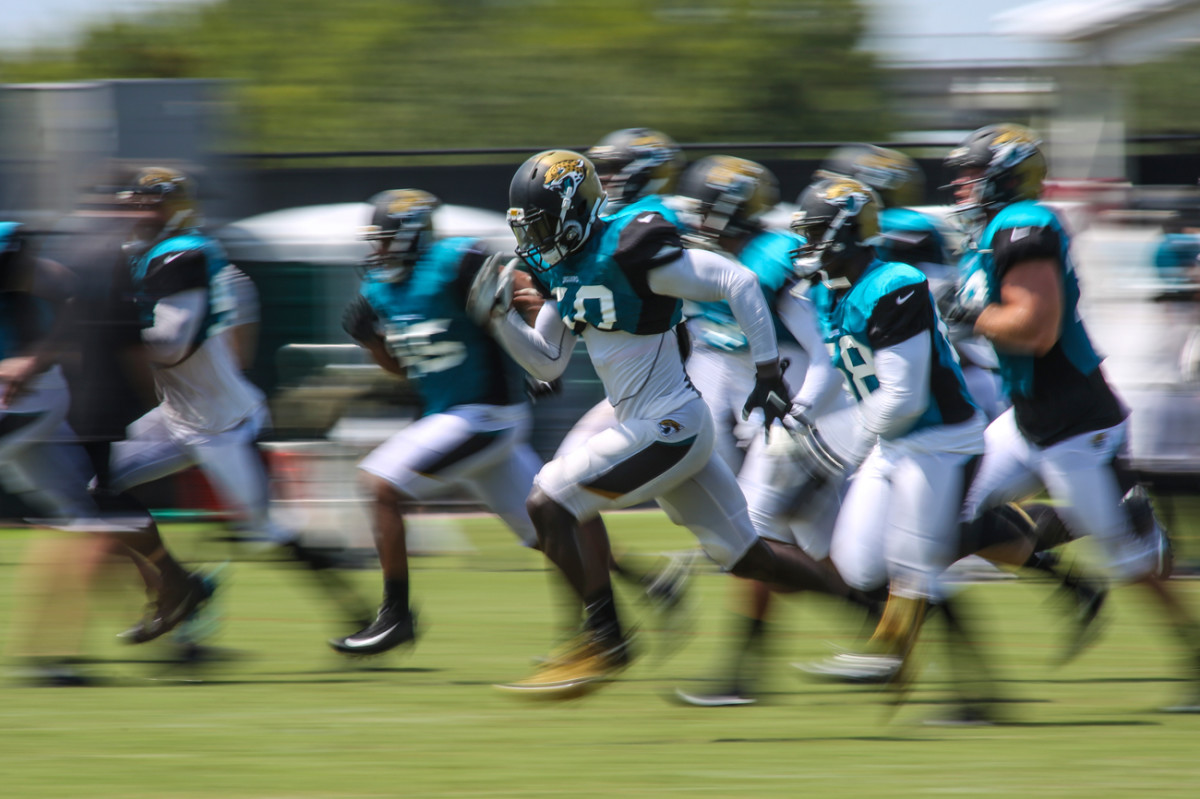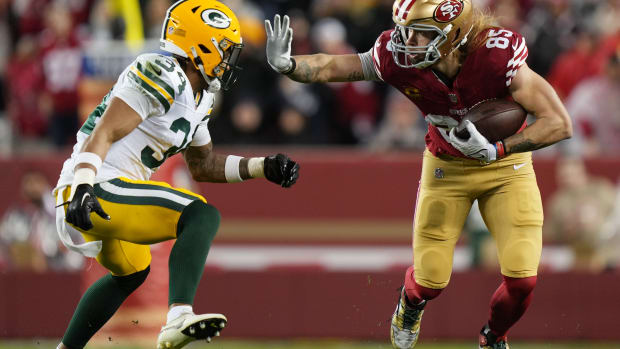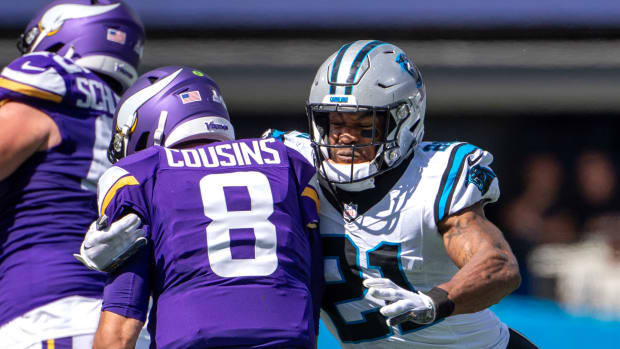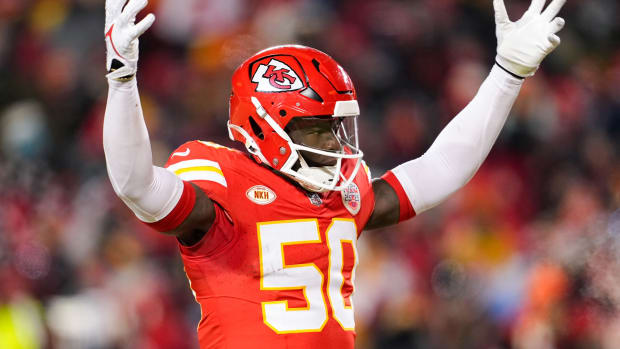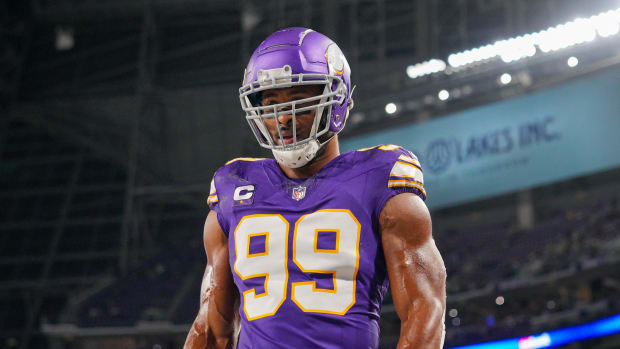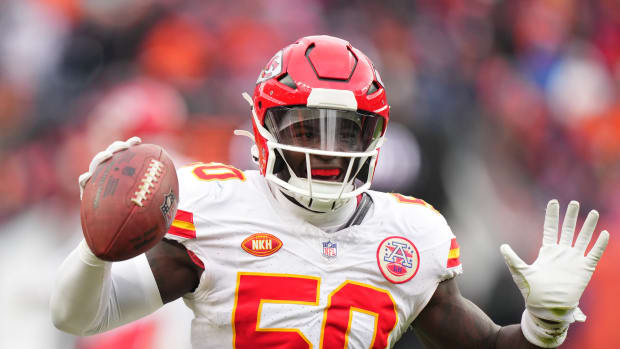Training Camp Lesson: Jaguars Embrace Physical, Tough Practice Atmosphere

The Jaguars are moving at a different speed in training camp than they have in previous seasons.
David Rosenblum/Icon Sportswire via Getty Images
Here’s a crazy stat: the Jaguars haven’t finished Top 20 in the NFL in rushing since 2011, which was the final season of Jack Del Rio’s nine-year run.
You almost have to be tryingto be that consistently below average to have that kind of streak.
And maybe that’s why I saw the Jaguars doing up-downs at the end of stretching following their joint practice with the Patriots last week. For most of us who played high school football, up-downs were either punishment or a way to toughen up a team, or both. But I can’t remember the last time I saw it at an NFL practice, and I told Jaguars veteran safety Tashaun Gipson that I wasn’t sure I’d encountered it in 12 years covering the league.
“It’s probably been longer than that!” Gipson responded. “I think it was new for everybody, when it was first sprung on us, the whole up-down thing.”
It doesn’t take the Junction Boys to see what this is about.
New football czar Tom Coughlin, and new coach Doug Marrone, are working now to give an edge to a team that got a little too country club under the last regime. And the kind of long, grinding practices the Jags are having weren’t rare during the first swing of my training-camp trip. I saw more contact and longer work across the board than I remember at any point since the new collective bargaining agreement went into effect in 2011.
Which brings me to my training camp lesson for the week. I was asked on TV a couple weeks ago what Bill Belichick’s next innovation might be. And the more I thought about it, the next zag to a league-wide zig coming was pretty clear: Some teams will be getting bigger and more physical to combat the smaller and faster rosters that have sparked the passing game’s explosion.
Last year, we saw it in Tennessee, with new GM Jon Robinson drafting jackhammers Jack Conklin and Derrick Henry as part of an image makeover. This year, it’s Jacksonville, and Coughlin and Marrone, guiding a similar philosophical shift with rookies Leonard Fournette and tackle Cam Robinson serving as hood ornaments for the drive. And so you have up-downs as post-practice gassers.
“I just think when you’re talking about trying to be a physical team, it’s all in the mindset,” Marrone said, in a quiet moment after practice. “So we’re gonna practice that way, with a lot of 1-on-1 run blocking, 9-on-7, combination blocking drills, things of that nature in the teaching progression. And the up-downs are something I’ve always done since I was a player, so for me, why should it end now?”
The answer is that, at least in Jacksonville, it won’t end now. And it’s hard to argue that the holdovers from last year have any sort of break.
So breakfast, which is mandatory (as are lunch and dinner), has been served from 5-7 a.m. every morning during camp. Practice runs from 10 a.m. to 12:30 p.m., right in the middle of those Florida summer days. And the players aren’t done until the walkthrough wraps up, normally just before 9 a.m.
“I wouldn’t say they’re trying to break you, but in this game, you want the most mentally and physically tough guys out there,” Gipson said. “And I think this is a way of seeing who’s tough and who’s ready to go to bat and help run this (team) the way they want it run.”
Asked if there was a particularly tough day, Gipson smiled and said, “I promise you, man, every day I go out there I say, ‘This is the toughest day I’ve been a part of.”
Gipson’s bought in, because he thinks it’ll pay off in September when the team is being tested, both mentally andphysically. As for the rest of the team?
“I always get that question,” Marrone said. “I don’t really ask the players, so I really can’t respond for them. I don’t ask, ‘Hey, how’s practice?’ or ‘What do you think?’ because the last time I checked, none of them have coached. What does happen is the players have to trust what you’re doing and what you’re trying to tell them, and I always tell them the reason why we’re doing things.
“I think that’s important. But how they feel? It’s better to ask them.”
I’m guessing that “tired” would be part of the answer.
































